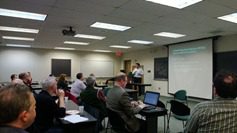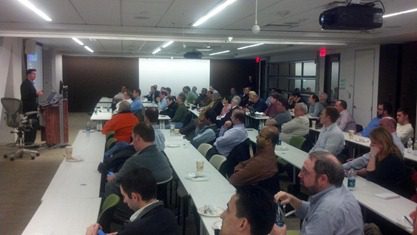SharePoint Productivity and Social Informatics
On my land-speed-record visit to the Boston area this week, I was able to join my good friend and Axceler business partner Jason “Mr. SharePoint BI” Himmelstein (@sharepointlhorn), on the road Tuesday night and visit the Portland, Maine SharePoint User Group (#SPUGME) where he presented on PowerPivot and other BI capabilities in SharePoint 2013. While Jason was up front chatting away, I sat back and did what I do  best: wait for someone to say something odd, and immediately blast it out as an out-of-context tweet. Like clockwork, Jason delivered, and I was there to take advantage of the situation. Comedy gold. But I digress…
best: wait for someone to say something odd, and immediately blast it out as an out-of-context tweet. Like clockwork, Jason delivered, and I was there to take advantage of the situation. Comedy gold. But I digress…
On Wednesday night, I presented for the second time to the Boston Area SPUG (#BASPUG), sharing my presentation on the top 10 SharePoint 2013 productivity features. My slides have been available for a couple months out on SlideShare, and here they are once again:
And last night (Thursday) I wrapped up my tri-state SPUG tour with the same presentation at the Granite State (New Hampshire) SPUG (#NHSPUG) in Nashua.
If you’ve never seen me present this topic, I walk through 3 sections: in the first, I outline 5 major “themes” in SharePoint 2013, and then define Productivity and why it is important. Next, I walk through the 10 features that I believe are the most relevant in SharePoint 2013 to improve individual and team productivity. And finally, I include one slide on what I feel are the most compelling reasons for considering a move to SP2013.
 While Microsoft included a number of new features and changes to the way the SharePoint platform supports collaborative organizations, my session outlines what I feel are the five primary areas of change. When talking through these themes, I try to put them in context for the Information Worker and the business decision-makers, helping them to understand not just the bells and whistles of the new version, but why Microsoft made these changes, and how many of them are in response to the changing social informatics of the way we work.
While Microsoft included a number of new features and changes to the way the SharePoint platform supports collaborative organizations, my session outlines what I feel are the five primary areas of change. When talking through these themes, I try to put them in context for the Information Worker and the business decision-makers, helping them to understand not just the bells and whistles of the new version, but why Microsoft made these changes, and how many of them are in response to the changing social informatics of the way we work.
For those who know me, you’ve heard me talk about social informatics for many years. About 8 years ago I was accepted into a doctoral program in which I had planned to pursue a degree on the subject, focusing on collaboration platforms and how the technologies we use have changed the way in which we work – which is a completely different topic than changes to technology based on consumer or business requirements/needs/changes. If you’re unfamiliar with the topic of social informatics, Wikipedia defines it as:
Social informatics is the study of information and communication tools in cultural, or institutional contexts.Another definition is the interdisciplinary study of the design, uses and consequences of information technologies that takes into account their interaction with institutional and cultural contexts.
In other words, technology can adapt to business needs, but real change in Information Worker habits, patterns, and productivity is driven by the evolution of technology. I often use the example in my talks of the incoming Millennials into the workforce and their expectations around communications tools. Bring Your Own Device (BYOD) and the Consumerization of IT are part of this change in expectations around the consumption of data, the role of personalization to drive group productivity, and expectations around our communication methods. We want data in real-time, we connect in dozens of different ways, and our tools and documents and contacts need to be portable and performant on whatever device we’re using.
With a number of new product announcements and plans at Axceler, its enabling me to go back into topics and themes that I have been writing about since the late 90’s, so watch for some great content going forward. In fact, I’ve dug up some old content that I wrote for my own startup that goes back to 1997, and plan to update some of it for my latest blog. It’s fun to look back at content I created more than a decade ago and find it to be as relevant to the conversation today. or maybe I’m just being intellectually lazy, reprinting old content. You be the judge.






I agree that real change in the habits of people at work is driven by the evolution of technology. People are more productive when they get tools that allow them to do their job to the best of their ability. Right now, I don’t know of many people who work with IT who can say that the software or hardware they use brings them to the maximum of efficiency.
There is room for improvement in most of what is offered nowadays. A lot of this is natural, because the teams that develop software and hardware learn more about the needs of their customers after their product enters the mass market.